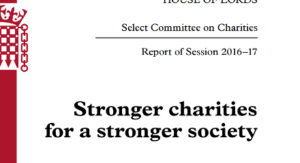Members of a Lords committee set up to scrutinise the charity sector have expressed “grave concerns” about the Charity Commission's plans to charge charities for regulation.
In a report, Stronger Charities for a Stronger Society, published today (Sunday 26 March), members of the House of Lords Select Committee on Charities said they are not convinced that the regulator has considered all the risks of going forward with charging.
The Charity Commission recently revealed that it has obtained permission from the Treasury to proceed with plans to consult on models for charging charities for regulation and a consultation is expected in the coming months.
In response to the Lords committee, the Commission said no changes would be made without a “without a full, open consultation”.
A number of sector bodies have already raised concerns about the impact charging for regulation could have on public trust in both the sector and the regulator and today the committee said it too had “grave concerns” and urged the Commission to set our clearer plans.
The committee said a “mandatory charge for registered charities would mark a fundamental change in the sector’s relationship with its regulator”.
‘Charities would seek to influence how money is spent’
Peers suggested that if charities were paying towards the regulator they might “not unreasonably, seek to be represented on the board” so that they could “ensure they have a say in how the money is spent”.
“It might also prompt calls for the regulator to become fully independent of government,” the report said.
Peers said it was “not clear” that the Commission had “taken full account of the potential impact of charging for regulation” both in terms of the financial impact on charities and how the public might view the move.
“If charging is mishandled, there are significant risks for the strength of the charity sector, its relationship with the regulator, and overall public confidence and trust in the charities,” the report said.
The committee said it was pleased about the recent assurance from the Treasury that funding from the sector would be additional, but said “adequate direct funding” from central government should be maintained. It called on the Commission to be “transparent” about how additional funding would be used.
In response a Commission spokesman said: “We recognise that this is a difficult discussion to have but are pleased that the committee understands why we need to consider this important issue and ask the question.
“We agree that making the benefits of any changes clear to charities, as well as the way in which our services may be enhanced, is important. We also recognise the funding pressures on charities, especially the small ones, and hope to find a way forward which is sensitive to that. No decisions will be made on charging without a full, open consultation.”
Commission’s governance needs to improve
The committee acknowledged the progress that the Commission has made in recent years, but also expressed concern about the regulator’s own governance arrangements, particularly the lack of diversity on its board.
During evidence sessions the regulator's board was criticised by Lord Foulkes for being a “fairly right-wing, upper middle-class, white, middle-aged group of people from the south of England”.
In supplementary written evidence Shawcross responded to say that he was disappointed by the comments and emphasise that the Commission has had people from different ethnic backgrounds on the board in the recent past.
In its report the committee concluded that the more should be done to increase diversity at the next opportunity.
It said: “We acknowledge the challenges that the Charity Commission faces in securing a diverse board, however the regulator cannot expect to hold the sector to a higher standard than it is able to achieve itself.
“We recommend that the Commission is mindful of the example it sets to the sector and that when filling future vacancies it explicitly seeks to recruit individuals with a range of skills, charity experiences and demographic characteristics, such as age, gender, ethnicity and geography.
“We expect to see the results of this approach in the next set of board appointments.”
Commission: we are committed to diversity
The Commission said it was committed to diversity and said that it would ask the Department for Culture Media and Sport, which is responsible for advertising for and recruiting board members, to work with a specialist recruiter.
A commission spokesman said: “Diversity is an important issue for the Commission and charities to consider. Indeed, it is an issue across government, parliament and in wider society.
“We are committed to continuing to improve diversity throughout the Commission, including on our board which has until recently comprised women from BAME backgrounds. Appointments to the board will be made by DCMS ministers, but when vacancies are next advertised we will ask DCMS to allow us to work with a specialist recruiter with expertise in recruiting a diverse range of candidates.”
NCVO: 'Charging must go hand-in-hand with reform'
Both charging for regulation and the Commission’s governance are areas of concern for many of the sector’s representative bodies, which commented on this part of the report in their responses.
NCVO said it plans to set out a range of criteria to judge charging proposals against.
You might also be interested in
Sir Stuart Etherington, chief executive of NCVO, said that “any move to charging should go hand in hand with an overhaul of the Commission’s governance”.
The Directory of Social Change and the Charity Finance Group have both been vocal opponents of any move to charging charities and said they welcomed the committee’s stance.










